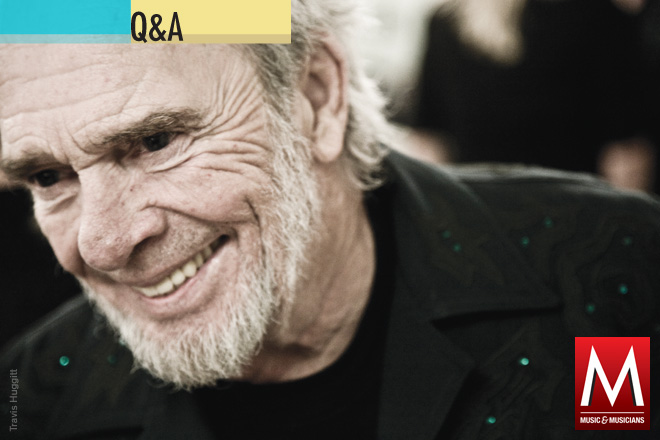MERLE HAGGARD
After beating lung cancer, “The Hag” still is who he is
Merle Haggard’s new album is called I Am What I Am, but that title could have been affixed to almost anything he’s recorded during his nearly half-century as one of America’s most stubbornly self-possessed singers and songwriters. He has built a body of work unequaled in the country genre, one created on clear-eyed slice-of-life classics like “Okie From Muskogee,” “Hungry Eyes,” “I’m a Lonesome Fugitive” and “Mama Tried.”
I Am What I Am is his first album since being treated for lung cancer in 2008, causing a rare—and thankfully temporary—disruption in his ceaselessly prolific output.
How has your approach to recording evolved over the years?
I have the knowledge of the game now. I didn’t know anything when I went in to do the first record. I didn’t know anything about it. I had a producer, Fuzzy Owen, who helped me a lot. Fuzzy still travels with me, but he’s deaf now! So he’s not able to help me in the sessions. And as for the musicians, most of the ones we worked with back then are either dead or have one foot in the grave. I work with a lot of young musicians now. Everything has changed.
What are some of those changes?
The methods of recording have changed quite a bit. They’ve got it now where if you can get somewhere in the general area of the right pitch they can bring you into key with an electronic manipulative device. But we still do our recordings the same way we did ’em 30 years ago. We still go to tape. We have a 24-track board and mix things down from that. We don’t do the digital thing until we go to the mastering room. They demand us to put it into a digital format so that it can be played on the air. But we try to bring it back as close as we can to reality by using some of the old methods.
Is that your natural singing voice that we’re hearing?
It’s really me. It’s a great effort to get my voice to sound that way. My breathing’s been affected because of the surgery, to the point where I now have to think about how I breathe. In the past, I didn’t have to watch my breathing. Now, it’s kind of like swimming—I’ve got to get a breath when I come to the top. I didn’t used to have to worry about things like that.
Has it made you a better singer?
I’ll have to leave that to the critics and to the audience. In my own opinion, I think it’s made a better singer of me.
Does the new album’s peaceful tone reflect how you feel about your life now?
I’m doing probably as good as a guy my age could be expected. I’ve got two lovely children and a lovely wife. I’ve got a lot of good friends. I seem to be holding my own. I’d be foolish not to be thankful to the Lord for my blessings.
In the title track, you sing that you’re no longer a fugitive or a drifter.
It’s hard to admit that you’re 73. It’s not good news, you know? The next big event is going to be your funeral. So I guess that song is explanatory of the condition of my life. I’m just leaning back in comfort and saying, “I’m here. This is me. This is what’s left. If you like it, well, good.”
–Jim Malec




comment closed